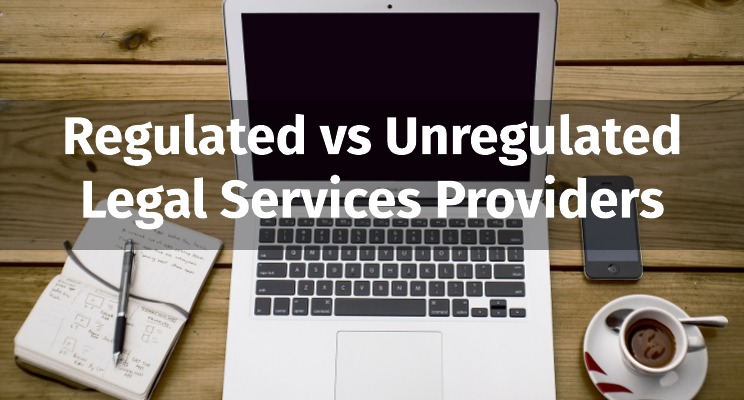Unregulated Legal Providers.

This final piece in our series of change hitting the legal profession, focuses on the disruption and loss of market to unregulated providers.
Currently these already exist in modest numbers but will grow strongly in coming years as new technologies find new spaces in between regulation to exist and flourish. When you consider the London black cab drivers battle against the huge disruption brought by new providers like Uber and Lyft, you can grasp how abruptly the landscape can change. Not only does technology open up new solutions to old problems, but it often finds ways around the strict existing regulations to provide such services, allowing dramatic cost savings and mass take-up if successful.
The Legal Services Board research (June 2016) into unregulated providers showed that they made up less than 5% of paid legal work annually. Two years on, I suspect that percentage has grown, as further technological advances are made in how legal services can be streamlined to self-service style solutions and in response to the regulated industry’s continued slow adaption to new consumer buying behaviour. Many unregulated providers will have a strong and innovative digital presence and have been faster and more agile in their efforts to capitalise on new markets. Their very lack of regulated status allows them to do all that without having to even consider full insurances or complaints procedures so credit should certainly be paid to many of them for voluntarily creating services which match the quality of regulated sector work.
The LSB decided in 2016 not to consider extending consumer protections to unregulated services because they discovered little evidence of harm and that consumer satisfaction rates are broadly similar to those achieved by regulated providers. 81% v 84% respectively.
Their research focused on the areas of Divorce, Wills and IP.
This research does suggest great value and low harm can be achieved in these legal areas, but I do think high consideration needs to be given to both the technical quality of work performed AND the contractual nature of how the consumer is engaged with the provider.
It is worth noting here that consumers have relatively low awareness of the differences between a lawyer, a solicitor, a regulated firm or otherwise. Add to that the fact that many unregulated providers employ solicitors which can give the impression of a fully regulated firm, not realising that possession of a practising certificate is totally separate from a regulated entity.
The LSB report also noted:
· More than half of consumers who instruct unregulated providers are aware of their regulatory status. Of those who don’t check, a significant proportion do not do so because they assume that they are regulated.
THAT is a very important fact indeed. Assumption is dangerous. Especially when dealing with advisors; whether they be financial, pension or legal. There is little doubt that the potential for damage is high if the advice is flawed.
The fundamental problem with unregulated providers is an absence of formal complaints policy and certainly no independent regulator to step in when things go seriously awry. There is not always insurance cover, no formal qualification process and no guarantees of transparency.
This affects only a minority of cases but there is little doubt that the individual impact of poor advice can be catastrophic, so it is important consumers have full knowledge of whether levels of protections and insurance exist or not for their case.
If we return to those 81% v 84% satisfaction levels, that means that nearly 1 in 5 users of all services was less than fully happy, the 19% who used unregulated providers will essentially be stuck in the creek without any paddle; whereas the 16% unhappy clients of regulated providers will be taking out their frustration through a written complaints procedure and recourse to the Legal Ombudsman or even the SRA if that does not solve the disagreement. If blame is upon the regulated law firm, their eye wateringly expensive insurance will potentially cover losses.
The growing ‘threat’ from unregulated providers is also a driving force behind the concerted efforts being made by the SRA to reduce the regulatory workload and simplify processes to give the regulated sector a stronger chance to survive.
I took a look at the range of fixed fee wills we have listed on JustBeagle. The cheapest product is £40 including a meeting, tax consideration and drafting right up to our priciest will service at £480. However, when I filtered to show five star rated services, the average cost came in at £100-£180 for the very best quality work. In other words, you can get the best quality, at the best price, as well as fully insured and regulated all with a bit of awareness and research.
Certainly Professor Susskind in his book The Future of the Professions makes the point repeatedly that our industry is well suited to transformation, repackaging, redistributing and repurposing. The bigger question is whether the regulated providers want to play a lead evolutionary role in that process and I am deliberately focusing this question on the valuable High Street consumer firms who are numerous but operating on extremely fine margins and very wary of making any sudden movements. For it is arguably they who face the greatest threat, not the big city or corporate firms who have thus far been very adept at considering AI, block chain and smart contracts to improve their range of services and expertise.